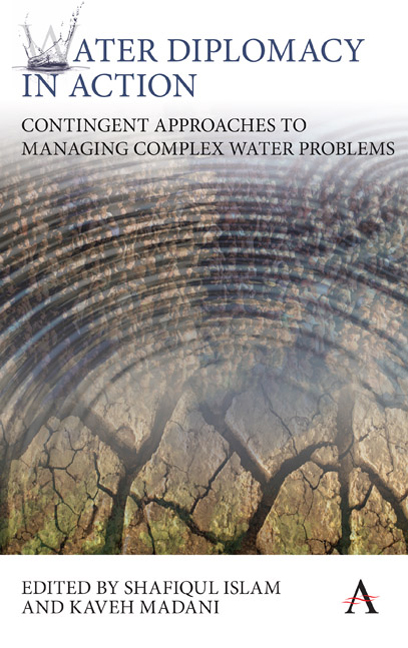Book contents
- Frontmatter
- Contents
- List of Figures
- List of Tables
- The Blind Men, the Elephant and the Well: A Parable for Complexity and Contingency
- Preface
- Part I ROOTS AND CAUSES OF COMPLEXITY AND CONTINGENCY IN WATER PROBLEMS
- Part II TOOLS, TECHNIQUES, MODELS AND ANALYSES TO RESOLVE COMPLEX WATER PROBLEMS
- Chapter Three Ten Bankruptcy Methods for Resolving Natural Resource Allocation Conflicts
- Chapter Four Flexible Design of Water Infrastructure Systems
- Chapter Five Extreme Value Analysis for Modeling Nonstationary Hydrologic Change
- Chapter Six The Water– Food Nexus and Virtual Water Trade
- Chapter Seven A Hybrid Analytical Approach for Modeling the Dynamics of Interactions for Complex Water Problems
- Chapter Eight A Call for Capacity Development for Improved Water Diplomacy
- Chapter Nine Water Complexity and Physics- Guided Data Mining
- Part III CASE STUDIES
- Notes on Contributors
- Index
Chapter Seven - A Hybrid Analytical Approach for Modeling the Dynamics of Interactions for Complex Water Problems
from Part II - TOOLS, TECHNIQUES, MODELS AND ANALYSES TO RESOLVE COMPLEX WATER PROBLEMS
Published online by Cambridge University Press: 10 January 2018
- Frontmatter
- Contents
- List of Figures
- List of Tables
- The Blind Men, the Elephant and the Well: A Parable for Complexity and Contingency
- Preface
- Part I ROOTS AND CAUSES OF COMPLEXITY AND CONTINGENCY IN WATER PROBLEMS
- Part II TOOLS, TECHNIQUES, MODELS AND ANALYSES TO RESOLVE COMPLEX WATER PROBLEMS
- Chapter Three Ten Bankruptcy Methods for Resolving Natural Resource Allocation Conflicts
- Chapter Four Flexible Design of Water Infrastructure Systems
- Chapter Five Extreme Value Analysis for Modeling Nonstationary Hydrologic Change
- Chapter Six The Water– Food Nexus and Virtual Water Trade
- Chapter Seven A Hybrid Analytical Approach for Modeling the Dynamics of Interactions for Complex Water Problems
- Chapter Eight A Call for Capacity Development for Improved Water Diplomacy
- Chapter Nine Water Complexity and Physics- Guided Data Mining
- Part III CASE STUDIES
- Notes on Contributors
- Index
Summary
Abstract
Contemporary water management problems involve a wide range of variables, processes, actors and institutions with competing and often conflicting constraints. These water management problems often cross different physical, jurisdictional and political boundaries. Traditional systems engineering approaches— with known equilibrium principles and well defined system boundaries and causal mechanisms— are not well suited for such boundary crossing problems. When natural and societal systems are coupled— as in the case of many complex water management problems— underlying assumptions of systems engineering are often violated. There is a need for changing the water management paradigm and practices from traditional systems engineering to complex adaptive management. A new domain of knowledge— known as complexity science— is emerging to address these complex management problems where crossing of boundaries, interconnectedness, nonlinearity, feedback, and sensitivity to timing and small changes can profoundly affect system performance. Despite general awareness about these complexities, there is a gap in available analytical tools needed to critically examine the nature and implication of different adaptive water management options. Using network theory and agent based modeling, this study presents a simple network model to address this gap between theory and practice of complex water resources management. Using a hypothetical transboundary water case study with a range of competing and conflicting agenda for varying number of agents, preliminary analyses of different scenarios and simulations suggest that (a) for sustainable and effective evolution and implementation of transboundary water negotiations, it is important to create opportunities for 4 to 8 agents to form alliance with shared objectives and mutual gains; (b) irrespective of initial positions of competing agents, there appears to be opportunities for resolution(s) to emerge and prevail for a well structured negotiation process; (c) a balance between rational response, contextual difference, and randomness in agent's behavior allows system to evolve adaptively and follow a sustainable trajectory; and (d) an optimal ratio between competing agendas and availability of resources is needed to achieve and sustain mutual gains.
Context and Motivation
Historically, water resources management addressed well- defined problems and traditional systems engineering techniques were used to solve these problems. Such approaches work well in addressing simple and complicated problems where there is a clear cause- and- effect relationship and the system has a well- defined boundary.
- Type
- Chapter
- Information
- Water Diplomacy in ActionContingent Approaches to Managing Complex Water Problems, pp. 111 - 140Publisher: Anthem PressPrint publication year: 2017

